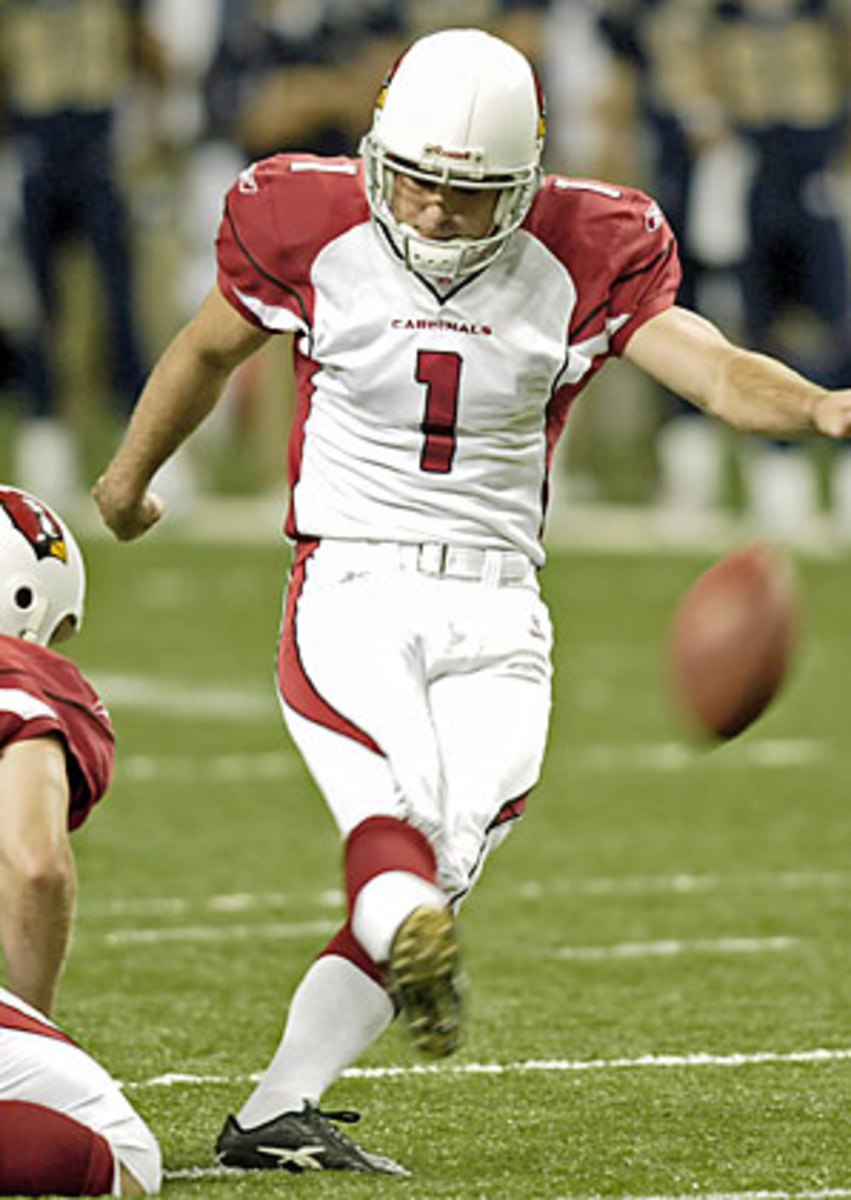A simple solution for finding kickers
The 2005 season was not a good one for the Arizona Cardinals. Although the Cardinals went 5-11, it was a good year for Neil Rackers and, as such, my fantasy team.
Despite missing a week with a leg injury, Rackers set an NFL record with 40 field goals. He missed just two; his 95 percent field-goal percentage also led the league. He hit six field goals from over 50 yards, two short of the NFL record. He was named to his only Pro Bowl.
Rackers was my kicker in my most important fantasy league, the one with high school friends (that also, coincidentally, has the biggest entry fee). I picked him up after David Akers, the kicker I drafted, got hurt. After a 1-3 start, I won my next eight games to make the playoffs and ended up finishing in fourth. That wasn't a bad return in a year I didn't draft that well.
For reasons I can only chalk up to youthful exuberance, field goals over 50 yards were worth seven points that year. Based on our system, Rackers' 40 field goals and 20 extra points were worth 199 points, making him the highest scorer on my team and in the top 30 of our league.
My success that season prompted change. A fellow league owner brought a PowerPoint presentation to the draft the following year, imploring us to eliminate kickers. Like all change, it came gradually; kicker points were devalued tremendously the next season and even more in the following years. We eventually voted to ax kickers before last season.
It improved our league tremendously. No one had to worry about picking up a kicker on a bye week last year; the season-long shuffling of kickers from week-to-week based on matchups and waiver position didn't happen, either. The numbers of angry e-mails sent in our fantasy e-mail chain stayed the same, of course, but at least they weren't about kickers. Harmony was restored.
Kickers' point totals are largely the product of their offenses. But even a good offense doesn't guarantee fantasy kicker points; the best come from teams that are able to drive to the ball down the field but not put it in the end zone. Rackers' '05 season was particularly huge because of his 95 percent accuracy, but he also attempted seven more field goals than any other kicker except Jay Feely. (Feely, then with the Giants, also attempted 42.) The top five kickers in attempts that year came from offenses ranked Nos. 4, 6, 8, 24 and 28.
Is there skill to picking a good kicker? A little, I guess. Rackers had tied an NFL record with three 50-plus field goals in a season the previous year; maybe his breakout season was predicted by some fantasy players. But kickers are almost interchangeable; a league-average kicker would still have produced an impressive output with the '05 Cardinals. This is true of all positions, but for kickers, plug-and-play is more the norm than at the offensive skill positions.
It's pretty much common knowledge kickers are an afterthought in fantasy football. In addition to helpfully ranking kickers in easy-to-remember tiers, SI.com's Eric Mack advised you to draft a kicker late. ESPN's Matthew Berry has been pushing leagues to get rid of kickers for years. In a reader column a few years ago, FF Today's Mike Davis discussed reader suggestions on what to do with kickers; one unveiled a strategy he'd used of drafting a ton of kickers to mess with everyone else in his league.
Though that's an admirable plan for chaos, there is an easier way of dealing with kickers: Just get rid of them! Our league is all the better for it. We've been so thrilled with the results we've already moved on to the next step: This year, no more defenses.
I expect similar success.
ON SALE SOON: Sports Illustrated's Fantasy Football 2011 issue tells you where all the free agents landed and what their fantasy impact will be, along with the critical draft strategy and stats analysis you need to win your league. Order one now.






